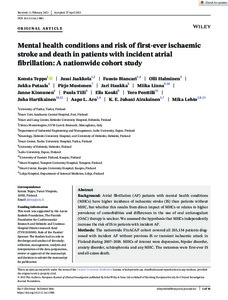Mental health conditions and risk of first-ever ischaemic stroke and death in patients with incident atrial fibrillation: A nationwide cohort study
Teppo Konsta; Jaakkola Jussi; Biancari Fausto; Halminen Olli; Putaala Jukka; Mustonen Pirjo; Haukka Jari; Linna Miika; Kinnunen Janne; Tiili Paula; Kouki Elis; Penttilä Tero; Hartikainen Juha; Aro Aapo L.; Airaksinen K. E. Juhani; Lehto Mika
https://urn.fi/URN:NBN:fi-fe2022081154484
Tiivistelmä
Background
Atrial fibrillation (AF) patients with mental health conditions (MHCs) have higher incidence of ischaemic stroke (IS) than patients without MHC, but whether this results from direct impact of MHCs or relates to higher prevalence of comorbidities and differences in the use of oral anticoagulant (OAC) therapy is unclear. We assessed the hypothesis that MHCs independently increase the risk of IS in patients with incident AF.
Methods
The nationwide FinACAF cohort covered all 203,154 patients diagnosed with incident AF without previous IS or transient ischaemic attack in Finland during 2007–2018. MHCs of interest were depression, bipolar disorder, anxiety disorder, schizophrenia and any MHC. The outcomes were first-ever IS and all-cause death.
Results
The patients' (mean age 73.0 ± 13.5 years, 49.0% female) mean follow-up time was 4.3 (SD 3.3) years and 16,272 (8.0%) experienced first-ever IS and 63,420 (31.2%) died during follow-up. After propensity score matching and adjusting for OAC use, no MHC group was associated with increased IS risk (adjusted SHRs (95% CI): depression 0.961 (0.857–1.077), bipolar disorder 1.398 (0.947–2.006), anxiety disorder 0.878 (0.718–1.034), schizophrenia 0.803 (0.594–1.085) and any MHC 1.033 (0.985–1.085)). Lower rate of OAC use partly explained the observed higher crude IS incidence in patients with any MHC. Depression, schizophrenia and any MHC were associated with higher all-cause mortality (adjusted HRs [95% CI]: 1.208 [1.136–1.283], 1.543 [1.352–1.761] and 1.149 [1.116–1.175], respectively).
Conclusions
In this nationwide retrospective cohort study, MHCs were not associated with the incidence of first-ever IS in patients with AF.
Kokoelmat
- Rinnakkaistallenteet [29337]
